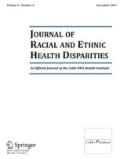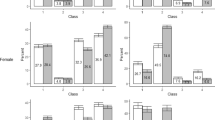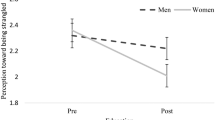Abstract
Objective
The primary aim of this study was to examine gender differences in predictors of past HIV test behavior among young African Americans.
Method
Data from (n = 190) young adults participating in an evidenced-based safer sex behavioral intervention were analyzed. Participants completed measures of previous HIV testing, HIV test attitudes, HIV knowledge, HIV test behavior, and HIV risk behaviors. A series of t tests and chi-square tests were performed to assess gender differences in these variables. Multivariate logistic regressions were performed to examine the influence of HIV test attitudes, knowledge of where to get tested, and HIV risk behaviors on having previously been tested for HIV.
Results
Overall, approximately 58% of the sample had been previously tested for HIV. There were significant differences between groups on HIV risk factors (i.e., number of sexual partners), such that men reported a significantly higher number of sexual partners in the past 3 months. Men also reported more negative HIV testing attitudes compared with women. Predictors of past HIV testing differed by gender. Negative attitudes about HIV testing were associated with significantly lower odds of past HIV testing among men, but this was not a significant predictor of testing among women. Older age was significantly associated with greater odds of past HIV testing among women, but not among men.
Conclusions
Understanding gender differences in predictors of HIV testing can provide important information for clinicians, counselors, and others working to increase rates of HIV testing among young Black/African American adults.
Similar content being viewed by others
References
HIV among African American Youth. Centers for Disease Control and Prevention Web site. https://www.cdc.gov/nchhstp/newsroom/docs/factsheets/archive/cdc-youth-aas-508.pdf. Published February 2014. Accessed November 10, 2017.
HIV among African Americans. Centers for Disease Control and Prevention Web Site. https://www.cdc.gov/hiv/group/racialethnic/africanamericans/index.html. Published February 2018. Accessed February 9, 2018.
HIV among Youth. Centers for Disease Control and Prevention Web site. https://www.cdc.gov/hiv/pdf/group/age/youth/cdc-hiv-youth.pdf. Published April 2017. Accessed November 10, 2017.
CDC Fact Sheet: HIV among African Americans. Centers for Disease Control and Prevention Web site. https://www.cdc.gov/nchhstp/newsroom/docs/ factsheets/cdc-hiv-aa-508.pdf. Published February 2017. Accessed November 10, 2017.
Chen M, Rhodes PH, Hall IH, Kilmarx PH, Branson BM, Valleroy LA. Prevalence of undiagnosed HIV infection among persons aged≥ 13 years—National HIV Surveillance System, United States, 2005–2008. MMWR Morb Mortal Wkly Rep. 2012;61:57–64.
Marks G, Crepaz N, Janssen RS. Estimating sexual transmission of HIV from persons aware and unaware that they are infected with the virus in the USA. AIDS. 2006;20:1447–50.
Cohen MS, Chen YQ, McCauley M, Gamble T, Hosseinipour MC. Prevention of HIV-1 infection with early antiretroviral therapy. N Engl J Med. 2011;365:493–505.
CDC fact sheet: the role of STD prevention and treatment in HIV prevention-CDC Fact Sheet. Centers for Disease Control and Prevention Website. https://www.cdc.gov/std/hiv/stds-and-hiv-fact-sheet-press.pdf. Published April 2010. Accessed November 12, 2017.
Health disparities in HIV/AIDS, viral hepatitis, STDs, and TB. Centers for Disease Control and Prevention Website. https://www.cdc.gov/nchhstp/health disparities/africanamericans.html. Published October 2016. Assessed November 12, 2017.
Decker MR, Rodney R, Chung SE, Jennings JM, Ellen JM, Sherman SG. HIV testing among youth in a high-risk city: prevalence, predictors, and gender differences. AIDS Care. 2015;27:555–60.
Arrington-Sanders R, Ellen J. Prevalence of self-reported human immunodeficiency virus testing among a population-based sample of urban African-American adolescents. J Adolesc Health. 2008;43:306–8.
Ma ZQ, Fisher MA, Kuller LH. School-based HIV/AIDS education is associated with reduced risky sexual behaviors and better grades with gender and race/ethnicity differences. Health Educ Res. 2014;29:330–9.
Stein JA, Nyamathi A. Gender differences in behavioural and psychosocial predictors of HIV testing and return for test results in a high-risk population. AIDS Care. 2000;12:343–56.
Longmore MA, Johnson WL, Manning WD, Giordano PC. HIV testing among heterosexual young adults: the influence of partners’ risk behaviors and relationship dynamics. J Sex Res. 2013;50:489–501.
Thomas PE, Voetsch AC, Song B, Calloway D, Goode C, Mundey L, et al. HIV risk behaviors and testing history in historically black college and university settings. Public Health Rep. 2008;123:115–25.
MacQueen KM, Chen M, Jolly D, Mueller MP, Okumu E, Eley NT, et al. HIV testing experience and risk behavior among sexually active black young adults: a CBPR-based study using respondent-driven sampling in Durham, North Carolina. Am J Community Psychol. 2015;55:433–43.
Lindong I, Edwards L, Dennis S, Fajobi O. Similarities and differences matter: considering the influence of gender on HIV prevention programs for young adults in an urban HBCU. Int J Environ Res Public Health. 2017;14:133.
Payne NS, Beckwith CG, Davis M, Flanigan T, Simmons EM, Crockett K, et al. Acceptance of HIV testing among African-American college students at a historically black university in the south. J Natl Med Assoc. 2006;98:1912.
Hall NM, Peterson J, Johnson M. To test or not to test: barriers and solutions to testing African American college students for HIV at a historically black college/university. J Racial Ethn Health Disparities. 2014;7:2.
Effective Interventions: HIV Prevention That Works. Centers for Disease Control and Prevention Web site. https://effectiveinterventions.cdc.gov/en/HighImpactPrevention/ Interventions/VOICES.aspx. Accessed November 14, 2017.
Boshamer CB, Bruce KE. A scale to measure attitudes about HIV-antibody testing: development and psychometric validation. AIDS Educ Prev. 1999;11:400.
Dennison O, Wu Q, Ickes M. Prevalence of human immunodeficiency virus testing and associated risk factors in college students. J Am Coll Heal. 2014;62:309–18.
Moore EW. Human immunodeficiency virus and chlamydia/gonorrhea testing among heterosexual college students: who is getting tested and why do some not? J Am Coll Heal. 2013;61:196–202.
Agresti A. Logistic regression. An introduction to categorical data analysis, 2nd edn. 2007. p. 99–136.
Branson BM, Handsfield HH, Lampe MA, et al. Revised recommendations for HIV testing of adults, adolescents, and pregnant women in health-care settings. J Natl Med Assoc. 2008;100:131–47.
McElrath K, Stana A, Taylor A, Johnson-Arnold L. Race/sex interactions and HIV testing among college students. J Racial Ethn Health Disparities. 2017;4:112–21.
Payne NS, Beckwith CG, Davis M, Flanigan T, Simmons EM, Crockett K, et al. Acceptance of HIV testing among African-American college students at a historically black university in the south. J Natl Med Assoc. 2006;98:1912–6.
Mancoske RJ, Rountree M, Donovan M, Neighbors I. HIV/AIDS knowledge and perceptions among African American male and female college students at a historically black university. J HIV/AIDS Soc Serv. 2011;5:221–32.
Onyeabor OS, Iriemenam N, Adekeye OA, Rachel SA. The effect of educational attainment on HIV testing among African Americans. J Health Care Poor Underserved. 2013;24:1247–56.
Caldeira KM, Singer BJ, O’Grady KE, Vincent KB, Arria AM. HIV testing in recent college students: prevalence and correlates. AIDS Educ Prev. 2012;24:363–76.
Bogart LM, Thorburn S. Are HIV/AIDS conspiracy beliefs a barrier to HIV prevention among African Americans? J Acquir Immune Defic Syndr. 2005;38:213–8.
Turner PA. I heard it through the grapevine: rumor in African-American culture. California: Univ of California Press; 1994.
Funding
Research reported in this publication was supported by a grant from the Substance Abuse and Mental Health Administration under award number Sp021121.
Author information
Authors and Affiliations
Corresponding author
Ethics declarations
All study procedures involving human participants were approved by the appropriate institutional and/or national research ethic committee and were performed in accordance with the 1964 Helsinki Declaration and its later amendments or comparable ethical standards. This study was approved by an Institutional Review Board and informed consent was obtained from all participants prior to study participation.
Conflict of Interest
The authors declare that they have no competing interests.
Rights and permissions
About this article
Cite this article
Moore, M.P., Belgrave, F. Gender Differences in Predictors of HIV Testing Among African American Young Adults. J. Racial and Ethnic Health Disparities 6, 189–196 (2019). https://doi.org/10.1007/s40615-018-0513-y
Received:
Revised:
Accepted:
Published:
Issue Date:
DOI: https://doi.org/10.1007/s40615-018-0513-y




